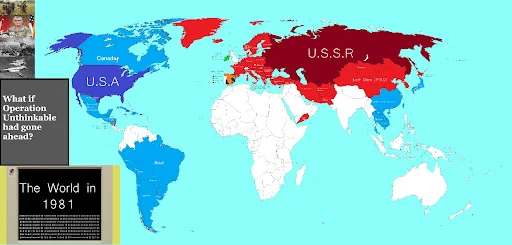In the annals of World War II history, many operations and strategies were considered and often shrouded in secrecy. Among the most audacious and controversial was Operation Unthinkable, a plan concocted by British Prime Minister Winston Churchill in 1945. This plan envisioned an Anglo-American invasion of the Soviet Union, turning former allies into adversaries shortly after the defeat of Nazi Germany.
Background
As World War II drew to a close, the Allied powers—primarily the United States, the United Kingdom, and the Soviet Union—had worked together to defeat the Axis powers. However, ideological differences between the Western allies and the Soviet Union, led by Joseph Stalin, were already causing tensions. Churchill, wary of Soviet intentions and Stalin’s growing influence in Eastern Europe, began to view the USSR not as a partner in peace but as a looming threat.
The Plan
Operation Unthinkable was born out of Churchill’s desire to counter the Soviet threat and curb its expansionist ambitions. The operation was divided into two primary plans:
1.Offensive Plan: The first plan, developed in May 1945, proposed a surprise attack on Soviet forces in Europe. The objective was to push the Soviets back to their 1939 borders and ensure the liberation of Eastern European countries under Soviet control. This plan envisioned the use of 47 British and American divisions, including a rearmed German force, amounting to over 100,000 soldiers.
2.Defensive Plan: The second aspect of Operation Unthinkable, formulated in July 1945, focused on defending Western Europe from a potential Soviet invasion. This plan was more conservative, emphasizing the protection of Allied-held territories in case of Soviet aggression.
Challenges and Feasibility
The feasibility of Operation Unthinkable was highly questionable. Several factors posed significant challenges:
-Numerical Superiority: The Soviet Red Army was significantly larger and battle-hardened after years of conflict on the Eastern Front. The logistical difficulties of engaging such a force were immense.
- Political Will: The United States, under President Harry S. Truman, showed little enthusiasm for a new conflict immediately following the end of World War II. Public opinion in war-weary Britain and America was also against another major military engagement.
- Allied Unity: The plan required seamless cooperation between British and American forces, as well as the integration of German troops. Given the recent hostilities, such cooperation would be fraught with mistrust and logistical complications.
The Aftermath
Operation Unthinkable was ultimately never put into action. The British Chiefs of Staff Committee evaluated the plan and concluded that the risks and costs far outweighed any potential benefits. The operation remained a theoretical exercise and was classified for many years.
Churchill’s proposition did, however, underscore the emerging Cold War dynamics. The plan reflected the deep-seated anxieties about Soviet intentions that would soon dominate international relations for decades. The ideological divide between the capitalist West and the communist East solidified, leading to the formation of military alliances such as NATO and the Warsaw Pact.
Legacy
Operation Unthinkable is a stark reminder of how quickly alliances can shift based on geopolitical interests. It highlights Churchill's strategic foresight and his recognition of the Soviet threat, which many contemporaries underestimated. The plan’s existence was not revealed until the 1990s, sparking debates among historians about the nature of post-war planning and the origins of the Cold War.
In conclusion, Operation Unthinkable remains one of the most intriguing "what if" scenarios of the 20th century. It epitomizes the complexity of wartime alliances and the precarious balance of power that emerged in the immediate aftermath of World War II.








No comments:
Post a Comment
Thank you for your support